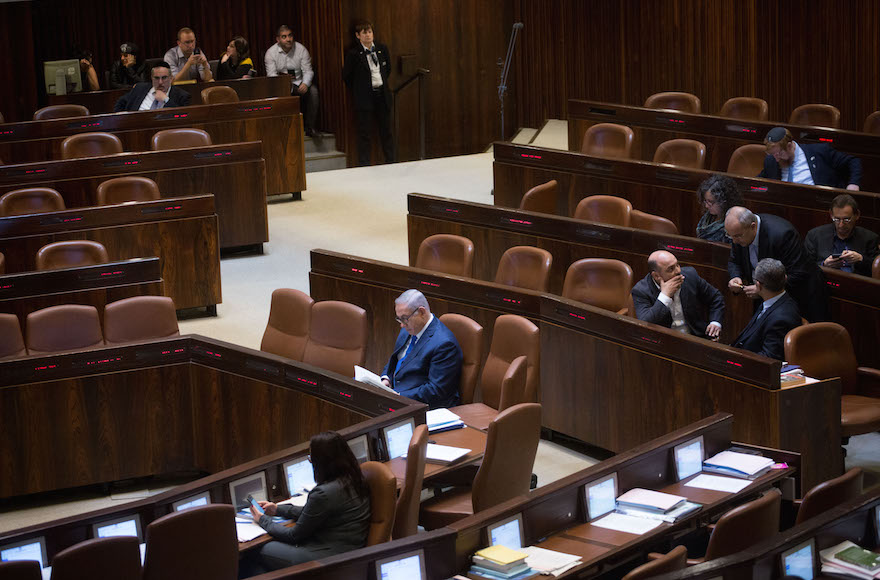JERUSALEM (JTA) — A Knesset bill that would exempt haredi Orthodox yeshiva students from the mandatory draft has brought the possibility of snap elections closer in Israel.
But it is only one variable in a complicated political dance involving the haredi parties, Israel’s colorful defense minister, the 2019 budget and the possibility that Prime Minister Benjamin Netanyahu will be indicted on corruption charges.
On Monday, the Ministerial Committee for Legislation approved a controversial bill that would essentially allow haredi yeshiva students to be exempt from the draft. Last September, the Supreme Court struck down a similar law that allowed mass exemptions for the students, saying it was discriminatory.
Supporters of exemptions for yeshiva students are trying again with the new measure, which reportedly is opposed by Attorney General Avichai Mandelblit. The attorney general reportedly does not believe the wording is sufficiently different from the old law.
The haredi parties also are calling for an amendment to the country’s Basic Law, which serves as a kind of a constitution, that would call Torah study a higher value than equality in military service and circumvent the high court.
Haredi men are now eligible for the draft, although in practice fewer than 4 percent of recruits are haredim. The disparity angers Israelis across the political spectrum, who resent that the religious students don’t help shoulder the burden of national security.
The haredi parties agreed to help pass the military exemption bill in its preliminary form, though they have made it clear they are expecting more. They have threatened retaliation: If the bill does not pass, the parties said they won’t vote to approve the country’s 2019 budget, which both Netanyahu and Economy Minister Moshe Kahlon, head of the Kulanu party, have identified as a high priority.
But Defense Minister Avigdor Liberman, who leads the Yisrael Beiteinu party, has called the legislation a “classic fake law.” His party, which has five seats in the government coalition, is both right wing and largely secular, and believes Israel’s near-universal draft is essential for its security. Liberman has vowed that not one Yisrael Beiteinu lawmaker will vote to approve the haredi conscription legislation, though he says his party will not consider bolting the coalition until the bill is actually approved by the parliament.
The result is a house of cards. The government believes it has enough votes to pass the legislation even without Liberman and his party, except that several of Kulanu’s 10 lawmakers have said they would not vote for the bill if Liberman does not support it.
If the bill does not pass and the budget fails because the haredi parties won’t vote for it, Kahlon and his party will leave the government. Liberman and his party will not stay in the government if the bill passes. Members of Kahlon’s party will not approve the legislation if Liberman does not. Rinse. Repeat.
Netanyahu on Monday said his government must stay the course.
“I call on all the coalition partners, first and foremost Defense Minister Avigdor Liberman, to remain in the government and to continue this partnership in order to guarantee security, prosperity and stability for the State of Israel,” the prime minister said.
A day earlier, Netanyahu had said that the one-seat majority he would hold if Liberman and his party bolted the coalition was “not an option.”
Netanyahu could call for early elections, both as a way to shore up his narrow coalition and affirm his public standing in the face of multiple corruption charges. But does he want to?
He certainly is confident that he will remain the head of the government with or without new elections.
“If there are elections, I will compete in them and win. But we’re not there yet,” Netanyahu said later on Monday.
Investigators last month recommended to prosecutors that Netanyahu be indicted in at least two corruption cases against him. A third case has picked up steam in recent weeks.
An indictment likely would cause the fall of the current government, while new elections could bring about more favorable numbers for Netanyahu and a potential new coalition. Polls still show his Likud party in a dominant position despite Netanyahu’s legal woes. If indicted, Netanyahu may prefer to be seen as the head of a new government with a fresh term in office as opposed to a lame duck finishing out his latest term, Haaretz’s Yossi Verter reported, citing a “consensus among party heads.”
Even if Netanyahu is forced to step down, a new Likud leader would be able to take over and keep a new government coalition, whatever its configuration, in place.
Netanyahu has a chance to break the late David Ben-Gurion’s record of 4,575 days in the premier’s office: He would need to stay on the job until near the end of September.
JTA has documented Jewish history in real-time for over a century. Keep our journalism strong by joining us in supporting independent, award-winning reporting.






